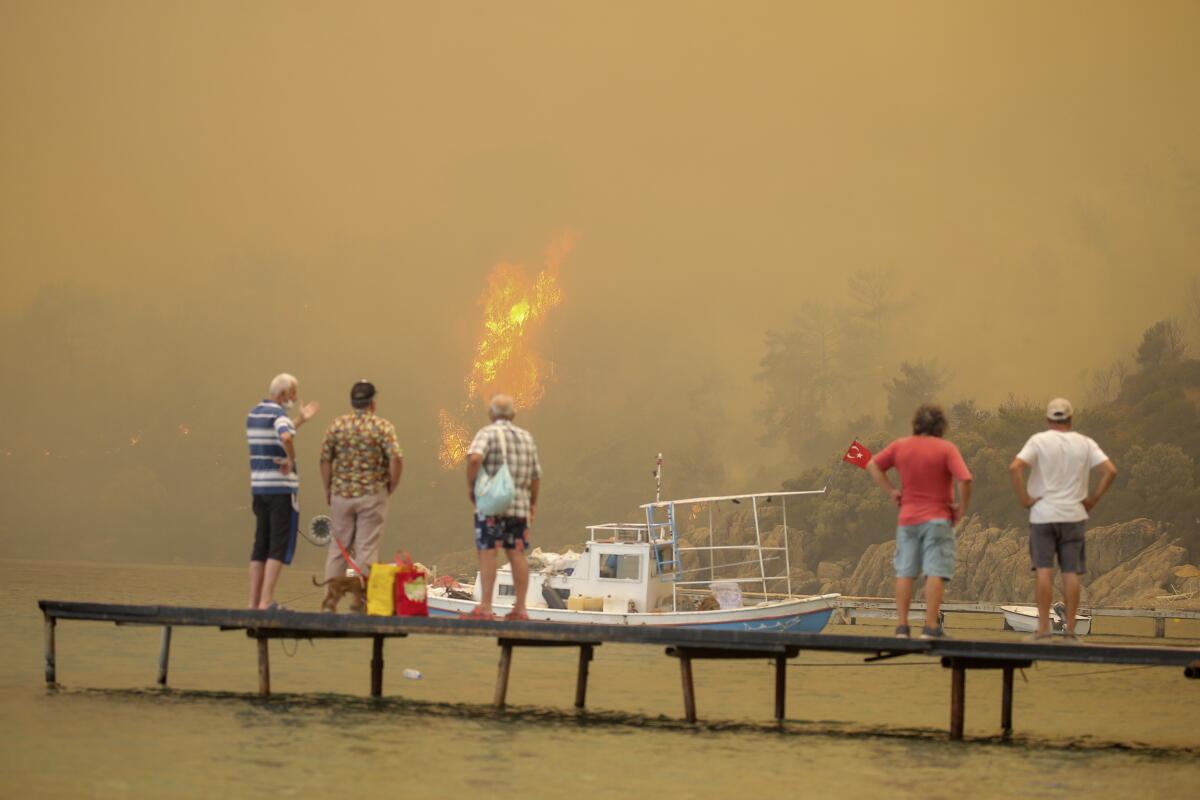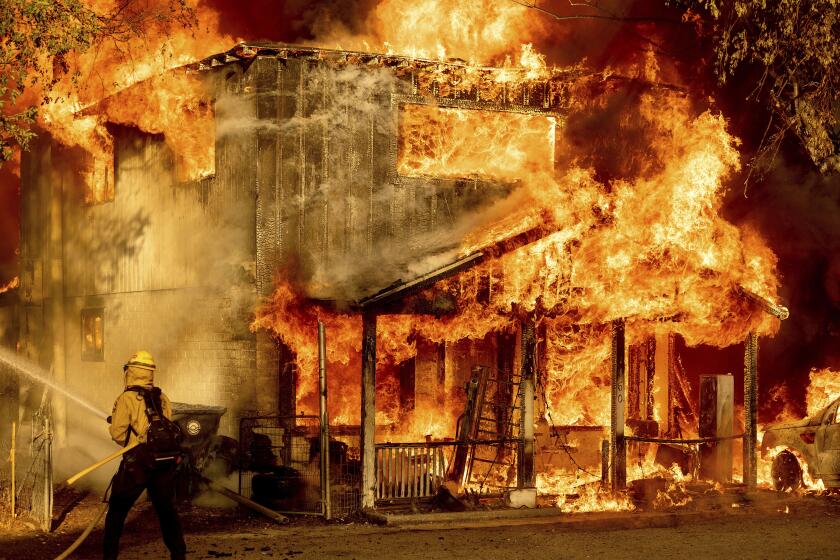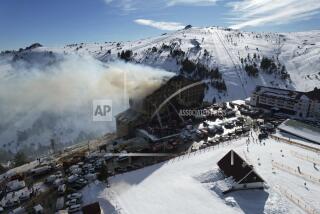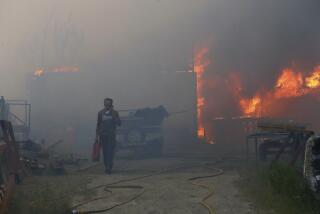Tourists, villagers flee as wildfires ravage Turkish resorts

- Share via
MAZIKOY, Turkey — Wildfires raged near Turkey’s holiday beach destinations of Antalya and Mugla and in the surrounding countryside for a fifth day Sunday as the discovery of more bodies raised the death toll to eight. Residents and tourists fled the danger in small boats while the coast guard and two navy ships waited at sea in case a bigger evacuation was needed.
Villagers, such as those in Mugla province’s Mazikoy, lost their homes and animals.
Mazikoy farmer Nurten Almaz said she lost everything. “I feel so much pain, like I lost a child,” she said. The 63-year-old woman lost her animals, her home and “one century of people’s labor.”
Residents used boats and vehicles to flee nearby Cokertme village as flames neared. In one video, fire trucks and cars were rushing to escape fire raging on all sides. After nightfall, the village looked apocalyptic from a distance, with flames taking over the dark hills.
The U.S. Forest Service lets some blazes burn. California officials say that practices should be updated as blazes explode, partly because of climate change.
Bodrum Mayor Ahmet Aras said Sunday evening that people experienced “hell” near Cokertme and Mazi as they drove away from the fire. He said the blaze could not be stopped and hoped to protect residential areas but it was too late for the trees.
The area was engulfed by Sunday night, Turkish broadcasters said. Reporters said they had to get hurry to safety as the fire intensified with strong winds. Officials said precautions were being taken to protect two thermic power plants in the vicinity and at present the winds were blowing away from the plants.
Authorities warned tourists and residents to keep evacuating Turunc, a town in the seaside resort of Marmaris in Mugla province. Fires enveloped the area and strong winds made firefighting efforts more difficult. A helicopter attempted to extinguish the blazes, which were unreachable by land.
Aerial firefighting was not possible Sunday night and the fires raged, burning acres of forests. Forestry official Mustafa Ozkaya said units continued to fight fires strategically, digging ditches and taking other measures. He said eight planes and 50 helicopters would fly in Mugla on Monday.
The European Commission announced it helped mobilized one firefighting Canadair plane from Croatia and two from Spain to aid Turkey. Planes from Ukraine, Russia, Azerbaijan and Iran have been helping.
Watching from out in the Mediterranean Sea, the area looked a bright orange.
As residents of villages around Marmaris pleaded for more help on social media, people boarded small boats carrying suitcases. Others waited anxiously to see if the fire would come down to the shore.
High temperatures and strong winds were making matters worse, with Antalya registering over 107 degrees Fahrenheit.
Earlier Sunday, police water cannons, usually used to control riots, helped helicopters and fire trucks in Mugla’s popular district of Bodrum to fight fires. Turkish television showed fires had reignited after being extinguished earlier, with flame and smoke approaching a village.
Social media videos showed tourists in Bodrum scampering down streets rolling their luggage to escape the nearby flames.
The Turkish health minister, Fahrettin Koca, said at least 27 people affected by the fires were still receiving treatment in hospitals while hundreds of others had been released.
The minister of forestry and agriculture, Bekir Pakdemirli, said 117 wildfires were “under control” across Turkey while eight continued. His tweets showed that since Wednesday, wildfires had ignited in 32 provinces.
While Turkish authorities say they are investigating whether the fires may have started as “sabotage” by outlawed Kurdish militants, experts mostly point to climate change along with accidents caused by people.
A heat wave across southern Europe, fed by hot air from North Africa, has led to wildfires across the Mediterranean, including on the Italian island of Sicily and in western Greece, where some residents had to be evacuated by boat to escape the flames.
On Sunday afternoon, bathers on an Italian beach south of the Adriatic city of Pescara fled when they spotted towering clouds of smoke and flames from a fire in a nearby pine forest, the Italian news agency LaPresse reported. Several people were reportedly injured when they tried to put out wind-whipped flames that had reached their homes. Local officials told state TV that an elderly home in Pescara had to be evacuated.
Meanwhile, in Turkey’s eastern Van province, floods over the weekend destroyed at least six houses after a small river overflowed amid heavy rains. Villagers were ordered to leave their homes and climb to higher locations.
More to Read
Sign up for Essential California
The most important California stories and recommendations in your inbox every morning.
You may occasionally receive promotional content from the Los Angeles Times.











